List of surface water sports
The following is a list of surface water sports; these are sports which are performed atop a body of water.
Towed water sports
Environmental impact includes noise, pollutants, shoreline degradation, and disturbance and dislocation of wildlife,[1] and the governing body, the International Waterski & Wakeboard Federation (IWWF) has been acting to reduce this impact. The IWWF also governs the related sports of barefoot skiing, cable skiing, cable wakeboard, disabled ski, racing, show ski, water skiing, and wakesurfing.[2]
Skurfing
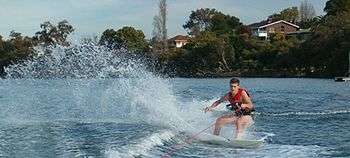
A surface water sport in which the participant is towed on a surfboard, behind a boat, with a ski rope. It is not a professional sport and has no competitions; it is a freestyle sport with highly individualistic style and form.
Tubing
Tubing, also known as biscuiting, is where a large circular rubber tube is towed behind a boat at fast speeds. The general aim is to hold on as long as possible without falling off due to the boat's sharp turns; more experienced biscuiters also try to jump the boat's wake and become airborne.
Wake sports
It is a sport that involves riding a wake while being towed by a motorboat, personal watercraft, close-course cable systems, ski lifts, winches or a crane[3] at speeds of between 30 and 40 mph.
Wakeboarding
In wakeboarding, the participant is towed on a small board riding a wake produced by the towing boat, and attempts to do tricks. Events are organized by the World Wakeboarding Association.[4] A special wakeboarding boat has a wakeboard tower, which places pull point higher above water's surface which makes it easier to jump. Wakeboarding boats have a ballast system that pumps water into tanks to increase displacement, and enlarge the wake.
Wakeskating
The main difference between boarding and skating is that in wakeskating the rider is not bound to the board so it's a lot easier to perform stunts. It's like skateboarding on water.
Wakesurfing
It differs from other wake sports in that the boat does not tow a rider (continuously). The rider uses a tow rope to help them get up in the wake. After doing so, they drop the rope and then ride the wake as they would when surfing.
Water skiing
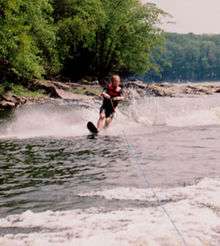
Water skiing is a sport/game and recreational activity and is popular in many countries around the world where appropriate conditions exist - an expanse of water unaffected by wave motion. Rivers, lakes, and sheltered bays are all popular for water skiing.
Standard water skis were originally made of wood but now are usually constructed out of fibreglass-based composites. They are of similar length to downhill snow skis but are somewhat wider. Instead of a rigid binding, they have rubber molded binding, in which the skier's feet are placed. Skiers are pulled along by a rope with a handle fitted at one end and attached to a powerboat at the other.
Board sports
Bodyboarding
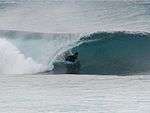
A bodyboard is an instrument of wave riding consisting of a small roughly rectangular piece of foam, shaped to a hydrodynamic form. The bodyboard is ridden predominantly lying down, (or 'prone'). It can also be ridden in a half-standing stance (known as 'dropknee') or can even be ridden standing up.
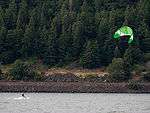
Kite sports
Kite surfing
Kite surfing, also known as kitesurfing and kiteboarding, and sometimes as flysurfing, involves using a power kite to pull a small surfboard with bindings.
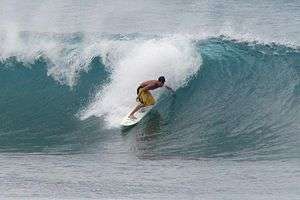
Wakestyle
Uses a wake-style board with bindings. It's a crossover from wakeboarding.
Wakeskate
Uses a wake-style board without bindings. It's a crossover from wakeskating.
Snowkiting
Aside from snow it is practiced on frozen water (lakes).
Paddleboarding
Paddleboarding is an activity in which a person paddles a long streamlined surfboard with their hands. This is done while laying or kneeling on the board. Padleboards are raced throughout the world.
Surfing
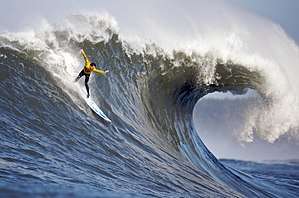
Surfing is a recreational activity in which individuals paddle into a wave on a surfboard, jump to their feet, and are propelled across the water by the force of the wave. Surfing's appeal probably derives from an unusual confluence of elements: adrenaline, skill, and high paced maneuvering are set against a naturally unpredictable backdrop—an organic environment that is, by turns, graceful and serene, violent and formidable.

Skimboarding
Skimboarding is a boardsport which involves riding a skimboard either on an outgoing wave, or in shallow water, where instead of going for waves the rider may attempt to ride a rail or do "tech" tricks.
Windsurfing
Windsurfing is a sport involving travel over water on a small 2–4.7 metre board powered by wind acting on a single sail. The sail is connected to the board by a flexible joint. The sport is a hybrid between sailing and surfing. The sail board might be considered the most minimalistic version of the modern sailboat, with the major exception that steering is accomplished by the rider tilting the mast and sail or, when planing, carving the board, rather than with a rudder.
Other
Hydrofoil sailing
This recent development in the high-speed sailing arena has evolved most in the International Moth class of racing dinghy. These boats have a "T" shaped rudder and centreboard that generates sufficient lift to clear the hull from the water. When this happens wetted surface area drops radically and the boats accelerate up to 1.2 to 1.5 times the speed of the prevailing wind. These boats are very light (all up weight is less than 40 kg) and very fast, They hydrofoil in as little as 8 knots (15 km/h) of breeze ("sit on the deck breeze" for most dinghy classes). The top recorded speed is about 50 km/hour, and speeds of 40 km/hour are common in the class.
Bodysurfing
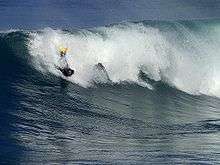
Bodysurfing is the art and sport of riding a wave without the assistance of any buoyant device such as a surfboard or bodyboard. Bodysurfers typically equip themselves only with a pair of specialized swimfins that stay on during turbulent conditions and optimize propulsion.
See also
References
- "International Water Ski & Wakeboard Federation Environmental Handbook for Towed Water Sports" (PDF). www.iwsf.com. Retrieved 2018-12-30.
- IWWF. "What is the IWWF". International waterski and wakeboard Federation. Retrieved 2018-12-29.
- Red Bull Wake Crane Pula
- "Welcome". World Wake Association. Retrieved 2018-12-29.